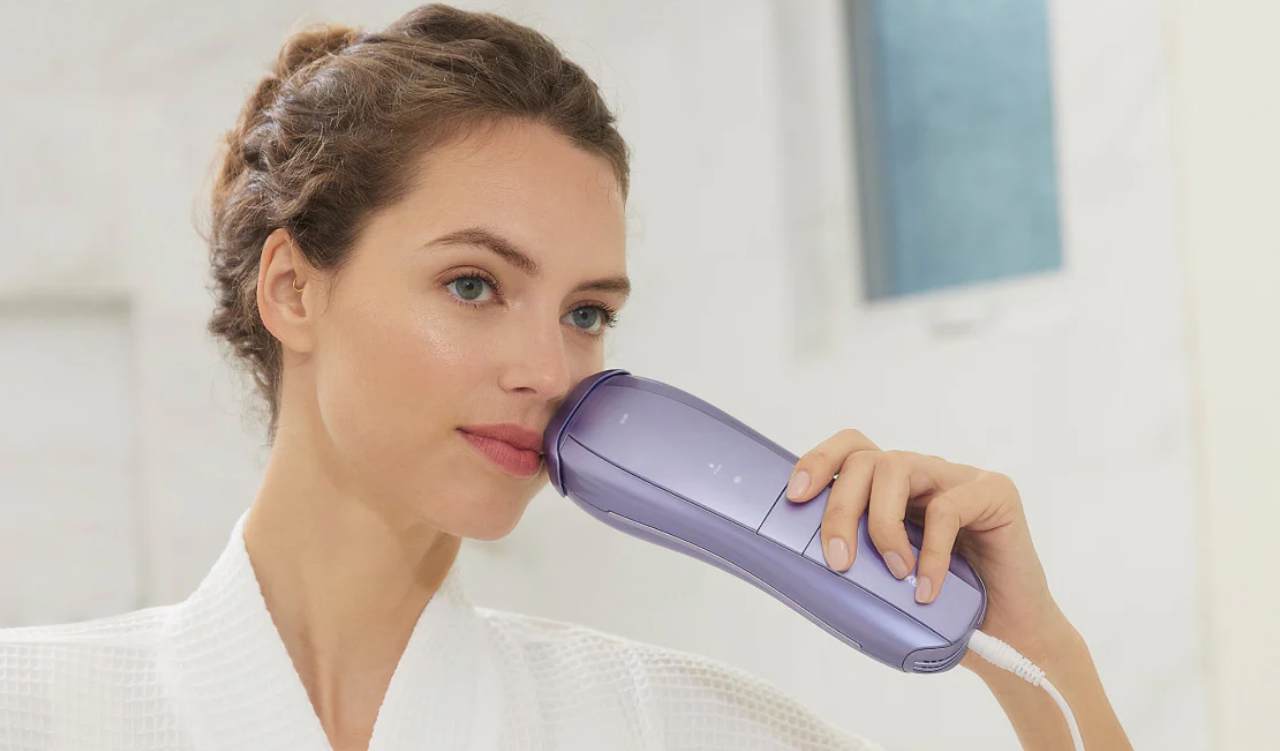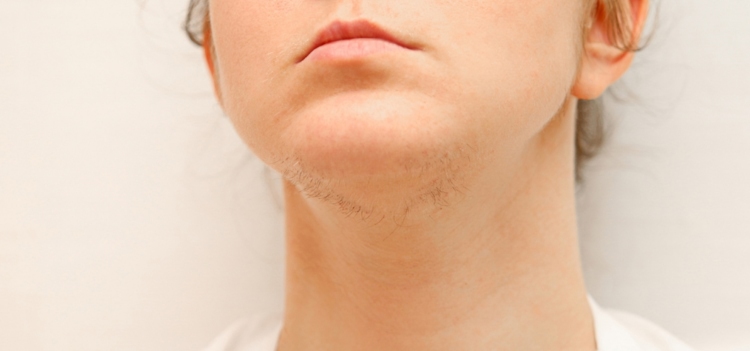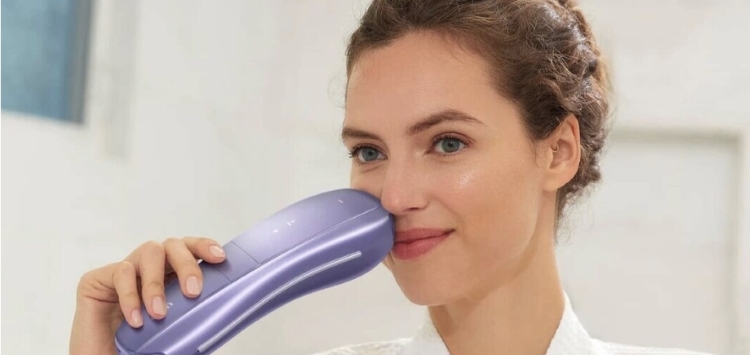
Hormonal hair growth is one of the most common issues for most women. Most females suffering from PCOS or other hormonal imbalances are prone to getting facial hair, which lowers their confidence to a greater extent. Therefore, they look for a permanent and convenient but fast solution that will ease their daily struggle with shaving, waxing, and other skin discomforts. One of the most effective and dermatologically recommended methods for getting rid of facial hormones due to hormonal imbalance is laser hair removal with Ulike IPL devices.
Table of Contents:
- Part 1: Hormonal Hair Growth (Hirsutism)
- Part 2: Which Conditions Can Lead To Excessive Hormonal Hair Growth On Face?
- Part 3: Can IPL Laser Hair Removal Devices Solve The Problem Of Hormonal Hair Growth?
- Part 4: What Is The Effectiveness of IPL on PCOS Laser Hair Removal?
- Part 5: Frequently Asked Questions
Hormonal Hair Growth (Hirsutism)
Hirsutism is a medical term for the growth of abnormal hair on hormonal hair growth areas such as the face, chest, and back. But what causes hirsutism? Let me explain with a little fact. We are all born with all the hair follicles we will ever have throughout our lives. But some medical conditions that present with hormonal imbalance, such as Insulin resistance, or PCOS, side effects of few medications, and age-related changes, can potentially trigger the formation of new hair follicles and the formation of thick hair in the existing follicles
Which Conditions Can Lead To Excessive Hormonal Hair Growth On the Face?

The first step in the treatment of hormonal hair is the diagnosis of the root cause and treating it first, before spending money on laser sessions or IPL devices. Let us first explore the factors that can lead to the formation of hair in hormonal hair growth areas.
Age-Related Conditions Leading to Hirsutism
Obesity
Obesity is associated with increased levels of fat in the body as compared to muscle mass or protein. It is directly linked to increased insulin levels, which trigger the kidneys to produce more androgens, leading to hair growth. One of the major reasons for PCOS is obesity.
It can affect individuals from all age groups but becomes more common with advancing age.
Menopause
Menopause is an age-related disorder that results when there is a cessation of egg release from the ovaries and a significant imbalance in the female reproductive hormones. The levels of estrogen hormone decrease and androgen level increases, which can lead to hirsutism. It usually occurs in women between 45 and 55 years of age.
Hirsutism Related To Medications
A number of medications, such as anabolic steroids, corticosteroids, and some anticonvulsants, can potentially trigger the formation of new follicles in hormonal hair growth areas.
Conditions That May Cause Hormonal Imbalance
- Insulin Resistance: Evidence links the onset of hirsutism to elevated insulin levels. Elevated blood insulin levels are more likely to increase the growth of hormonal hair than elevated androgen levels. It is also related to triggering the production of androgens.
- Cushing’s Syndrome: When the body is exposed to cortisol for a long period of time, it leads to Cushing’s syndrome. Elevated levels of cortisol increase androgens and, thus, hair growth.
- Polycystic Ovary Syndrome (PCOS) is one of the most common endocrine disorders. And is characterized by an imbalance in the female reproductive hormone cycle. High levels of androgens and testosterone are associated with the condition. It is presented with acne, hirsutism, and a male-like pattern of baldness. Therefore, it has major implications for mental, reproductive, and metabolic health.
Can IPL Laser Hair Removal Devices Solve The Problem Of Hormonal Hair Growth?

When it comes to getting rid of unwanted hair, Ulike IPL hair removal devices are very efficient, non-intrusive, and ensure durable treatment. IPL therapy works by inhibiting the formation of new hair in follicles, especially facial hair. The mechanism of IPL therapy includes the heat generated by IPL devices targeting the hairs that are in growing phases, thus disturbing the normal cycle of hair growth. As a result, the targeted hair falls out, gradually weakening the hair follicle and hair roots. After several sessions, thick hair roots are destroyed, resulting in smaller and finer hairs.
Ulike IPL Devices Specific For PCOS Hair Growth Areas
Unlike shaving and waxing, IPL treatment is a non-painful and non-invasive process. You get permanent and promising IPL results only when performed with innovative equipment like the Ulike Air 10 and Air 3. This therapy ensures that there is NO resulting skin irritation or rash formation and is highly advantageous for women with PCOS-sensitive skin.
Does Science Support The Relation Between IPL Devices and Hormonal Hair Growth?
A study titled “Laser Hair Removal In Women With PCOS” concluded that 95% of the respondents expressed satisfaction with the results. Among the 60 participants in the study who received 6 sessions of laser hair removal, only 2.6% of them experienced a period of 6 weeks without any hair. However, this number increased to 31% following 12 treatments. Significant advancements in laser technology have occurred since then. Therefore, our latest and top-rated Ulike Air 10 is the only IPL device that delivers satisfactory results, even for individuals with hormonal hair growth.
What Is The Effectiveness of IPL on PCOS Laser Hair Removal?

One of the important factors for measuring the effectiveness of IPL treatment is its ability to provide satisfactory and long-term results. As we know, when the hair follicles are destroyed by heat over time, the new follicles produce hairs that are thinner and lighter in color. Although regular maintenance treatments are required to achieve complete hair reduction, as mentioned in the research above, the time between IPL sessions becomes longer over time, resulting in extended periods with no need for any kind of treatment (shaving, waxing, or IPL). Therefore, in terms of effectiveness, IPL therapy is advantageous for women with PCOS laser hair removal treatment.
Conclusions
IPL therapyPcos hormonal hair growth
Frequently Asked Questions
1. Is IPL laser hair removal effective for hormonal facial hair?
Yes. Hormonal hairs are usually thick and dark. IPL devices target the hair with more hair pigment (melanin) and hence, IPL targets the hormonal dark and denser hair effectively. However, It is recommended to resolve the underlying cause of hirsutism or hormonal imbalance.
2. How does PCOS lead to excessive hair growth?
In order to understand, you need to know that there are two different types of hair follicles.
Terminal hairs, are coarse, and pigmented hairs present in our scalp, eyelashes, eyebrows, and pubic areas. Others are villus hair, which are short, and silky hairs that cover areas of our body that we typically consider hairless, such as our temples, chests, and backs.
In PCOS, hormonal imbalance (insulin, androgen, and testosterone) is responsible for the production of new hair follicles and turning existing fine hairs into thick hairs.
3. Can I stop PCOS hormonal hair growth?
Women who suffer from excessive unwanted growth of hair at PCOS hair growth areas can benefit from using IPL Ulike Air 10 and Ulike Air 3. IPL treatment not only decreases hair production but is also able to enhance confidence and self-esteem among patients suffering from the psychological aspects of the condition. For more information, check out how our clients have stopped the production of their PCOS hormonal hair growth.






































